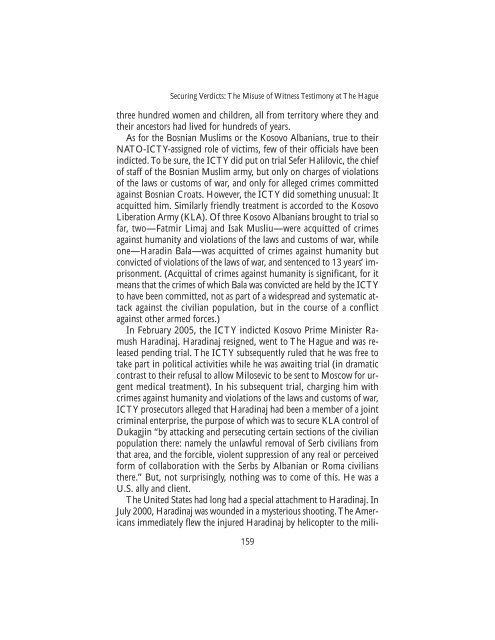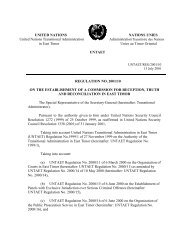The Srebrenica Massacre - Nova Srpska Politicka Misao
The Srebrenica Massacre - Nova Srpska Politicka Misao
The Srebrenica Massacre - Nova Srpska Politicka Misao
Create successful ePaper yourself
Turn your PDF publications into a flip-book with our unique Google optimized e-Paper software.
Securing Verdicts: <strong>The</strong> Misuse of Witness Testimony at <strong>The</strong> Hague<br />
three hundred women and children, all from territory where they and<br />
their ancestors had lived for hundreds of years.<br />
As for the Bosnian Muslims or the Kosovo Albanians, true to their<br />
NATO-ICTY-assigned role of victims, few of their officials have been<br />
indicted. To be sure, the ICTY did put on trial Sefer Halilovic, the chief<br />
of staff of the Bosnian Muslim army, but only on charges of violations<br />
of the laws or customs of war, and only for alleged crimes committed<br />
against Bosnian Croats. However, the ICTY did something unusual: It<br />
acquitted him. Similarly friendly treatment is accorded to the Kosovo<br />
Liberation Army (KLA). Of three Kosovo Albanians brought to trial so<br />
far, two—Fatmir Limaj and Isak Musliu—were acquitted of crimes<br />
against humanity and violations of the laws and customs of war, while<br />
one—Haradin Bala—was acquitted of crimes against humanity but<br />
convicted of violations of the laws of war, and sentenced to 13 years’ imprisonment.<br />
(Acquittal of crimes against humanity is significant, for it<br />
means that the crimes of which Bala was convicted are held by the ICTY<br />
to have been committed, not as part of a widespread and systematic attack<br />
against the civilian population, but in the course of a conflict<br />
against other armed forces.)<br />
In February 2005, the ICTY indicted Kosovo Prime Minister Ramush<br />
Haradinaj. Haradinaj resigned, went to <strong>The</strong> Hague and was released<br />
pending trial. <strong>The</strong> ICTY subsequently ruled that he was free to<br />
take part in political activities while he was awaiting trial (in dramatic<br />
contrast to their refusal to allow Milosevic to be sent to Moscow for urgent<br />
medical treatment). In his subsequent trial, charging him with<br />
crimes against humanity and violations of the laws and customs of war,<br />
ICTY prosecutors alleged that Haradinaj had been a member of a joint<br />
criminal enterprise, the purpose of which was to secure KLA control of<br />
Dukagjin “by attacking and persecuting certain sections of the civilian<br />
population there: namely the unlawful removal of Serb civilians from<br />
that area, and the forcible, violent suppression of any real or perceived<br />
form of collaboration with the Serbs by Albanian or Roma civilians<br />
there.” But, not surprisingly, nothing was to come of this. He was a<br />
U.S. ally and client.<br />
<strong>The</strong> United States had long had a special attachment to Haradinaj. In<br />
July 2000, Haradinaj was wounded in a mysterious shooting. <strong>The</strong> Americans<br />
immediately flew the injured Haradinaj by helicopter to the mili-<br />
159



